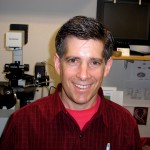BUSM Professors Receive American Health Assistance Foundation Grants
 Benjamin Wolozin, PhD
Benjamin Wolozin, PhD
Boston University School of Medicine’s (BUSM) Benjamin Wolozin, PhD, professor of pharmacology and neurology, and Matthew Nugent, PhD, professor of biochemistry, ophthalmology and biomedical engineering, have been awarded grants from the American Health Assistance Foundation (AHAF) to study age-related degenerative diseases. This marks the first time in more than a decade that BUSM has received an AHAF grant.
The AHAF is a nonprofit organization that funds ground-breaking, early-stage research on Alzheimer’s disease. The foundation seeks to eradicate age-related degenerative diseases by advancing research seeking causes, prevention, treatment and cures, promoting positive behaviors to combat these diseases and facilitating the public’s efforts to assist those who are affected.
Wolozin was awarded a two-year $150,000 grant for research on RNA binding proteins in Alzheimer’s disease. RNA binding proteins (RBPs) regulate the conversion of messenger RNA into protein through the formation of complexes called RNA granules. Cellular stresses induce formation of a particular type of complex, termed stress granules (SG). By examining SGs, Wolozin has identified a new consequence of Alzheimer’s disease. In this project he will investigate how these SGs might contribute to the causes of Alzheimer’s disease.
“I am very excited about this work because it uncovers a new and potentially pivotal part of Alzheimer disease and sets the stage for major new advances in the field addressing both diagnosis and therapy,” said Wolozin.
Nugent, who was awarded a two-year $100,000 grant, will research macular degeneration. Excess vascular endothelial growth factor (VEGF), a protein that stimulates blood vessel growth, has been shown to be a major cause of unwanted vessel growth into the retina in wet age-related macular degeneration (AMD). AMD is a disease of the retina that is the leading cause of blindness in Americans 65 and older. The wet, or more elevated form of this disease, accounts for 90 percent of all blindness from AMD. Nugent and his team propose to identify new ways that VEGF activity is naturally controlled by interactions with the protein fibronectin, so that this pathway can be targeted for a more effective treatment for wet AMD.
 Matthew Nugent, PhD
Matthew Nugent, PhD
“Current treatments that attempt to stop excessive blood vessel growth target VEGF, but are only partially effective because VEGF appears to be protected through interactions with the meshwork surrounding cells,” said Nugent. “We propose to better define the normal role of the interaction between VEGF and the meshwork so that we might be able to develop new therapies.”
Of the AHAF grants totaling more than $3.6 million, the research topics in the 22 funded projects include early Alzheimer’s diagnosis, drug targets and drug discoveries.
View all posts